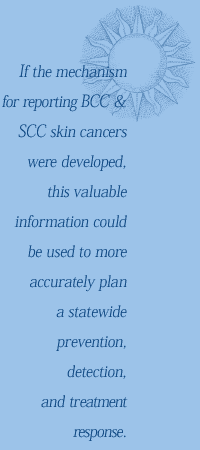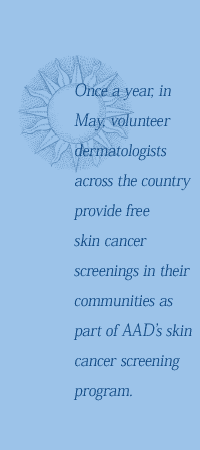



V. Cancer prevention and information services that impact the skin cancer problem
| A. Programs in Texas that include skin cancer initiatives | ||||
| 1. Public agencies | ||||
| a)
The Texas Department of Health The Texas Comprehensive School Health Network is funded by several state organizations, including the Texas Cancer Council and the Bureau of Children's Health within the Texas Department of Health. This organization works through the Texas Education Association's regional school health specialists to promote life-long cancer risk reduction behaviors among school children. Skin cancer awareness is a part of their program. |
||||
| b)
Cancer Registry of the Texas Department of Health The Cancer Registry describes its mission as follows "The Texas Cancer Registry (TCR) collects all incident reports of neoplasms occurring among state residents, including certain benign tumors and borderline malignancies. The TCR is a population-based reporting system. Texas hospitals and cancer treatment centers are the primary sources of case reporting. Reports also are received from outpatient clinics and freestanding pathology labs. The data used in this report were primarily abstracted from medical records and pathology reports." [ 21 ] Currently, the TCR collects data on skin cancer excluding basal cell and squamous cell. If the mechanism for reporting these two skin cancers were developed, this valuable information could be used to more accurately plan a statewide prevention, detection, and treatment response. |
||||
| c)
Centers for Disease Control (CDC) The CDC is developing a nationwide program in partnership with state health departments, including Texas. Skin cancer is only one component of the program that aims to build coalitions to foster cancer control. |
||||
| d)
Texas Cancer Council (TCC) [
22 ] Programs related to skin cancer currently supported by the TCC: |
||||
| i)
Texas Comprehensive School Health Network As described in TDH section above. |
||||
| ii)
Physician Oncology Education Program (POEP) (Information supplied by the POEP) The purpose of the Physician Oncology Education Program (POEP) is to provide Texas physicians and physicians in training, including medical students, with the knowledge and skills necessary to reduce cancer morbidity and mortality through collaboration with the public, private and volunteer sectors of the state. The POEP is a Texas Cancer Council program administered by the Texas Medical Association. Of the numerous initiatives carried out by the POEP, the following a re closely related to the prevention, early detection, and control of skin cancer: |
||||
| • | Skin Cancer: Prevention and Early Detection: a self-study course (spiral-bound booklet and 35mm slides) for primary care physicians on the prevention, screening, early detection, and control of skin cancer. Provides up to 1 hour of AMA/PRA Category 1 CME credit | |||
| • | Cancer Control: The Physician's Role: a booklet designed to strengthen physicians' communication skills in discussing with patients skin cancer prevention, screening, and risk reduction. | |||
| • | Core Curriculum Objectives for Cancer Prevention, Screening, and Early Detection: a booklet of priority-rated recommendations, education of primary care physicians on prevention, screening, and early detection of skin cancer; for use in planning curricula and writing objectives for continuing education. | |||
| • | CME Seminars: State-of-the-science seminars are coordinated and facilitated by the POEP on a variety of cancer topics, including skin cancer and related topics. Seminars take place in locations throughout Texas with topics determined by local physicians. | |||
| • | Speakers' Bureau: Lectures are provided at no charge upon request to medical professionals on a wide variety of topics, including skin cancer, melanoma, sarcoma, and other related topics. | |||
| • | Skin Cancer: Prevention and Early Detection: a self-study course (spiral-bound booklet and 35mm slides) for primary care physicians on the prevention, screening, early detection, and control of skin cancer. Provides up to 1 hour of AMA/PRA Category 1 CME credit | |||
| • | HealthNet: An interactive program broadcast nationally via satellite in order to provide continuing education for physicians, physician assistants, and nurses. The HealthNet program for 2000 is entitled, "Skin Cancer: Prevention and Early Detection." | |||
| • | American Cancer Society Screening Guidelines Pocketguide: Based on ACS recommendations for the early detection of cancer, this pocketguide includes cancer-related check up recommendations for skin cancer screening. | |||
|
iii) Nurse
Oncology Education Program (NOEP) |
||||
| iv)
Cancer Risk Reduction through the Texas Agricultural Extension Service
The project is aimed at addressing the constant need for awareness building, education, and supportive environmental modifications to enable Texans to reduce their skin cancer risk and seek early detection. Extension agents are included in this outreach. The resource list includes skin cancer awareness, travelling displays and brochures; education about the hazards of tanning beds; teacher materials for K-12, videos, and slides. Materials delivered re p resent selections of available educational re s o u rces developed by: the American Cancer Society (ACS), The university of Texas M.D. Anderson Cancer Center, the American Academy of D e r m a t o l o g y, and the Skin Cancer Foundation. A summary of Community Health Needs within Texas is available at http://futuresforum.tamu.edu/index.htm |
||||
| iv)
Texas Cancer Data Center (TCDC) Located in Houston, Texas, at The University of Texas M.D.Anderson Center and accessible on the Internet at http://www.txcancer.org/, the organization's mission is to maintain a computerized repository and clearinghouse of cancer resources available to all Texans. The TCDC sponsors the website, "Cancer Gateway of Texas" the purpose of which is to "provide the residents of the state of Texas convenient and organized access to cancer-related resources, publications, and information available on the Internet." http://www.cancergateway.org/ Note: Additional TCC initiatives are listed in the Appendix. |
||||
| e) Texas Education Agency (TEA) | ||||
| Collaborates with TDH, for School Health Program; and with the ACS, for the Comprehensive School Health Initiative. | ||||
| 2. Public / private health-care providers | ||||
| The University of Texas M.D. Anderson Cancer Center | ||||
| i)
Professional Education Prevention and Early Detection (PEPED) The PEPED program, within the Division of Cancer Prevention, offers education for professionals and lay groups regarding prevention and early detection of skin cancer. The program includes one-day education courses for health care practitioners, including risk assessment, recognition of common benign and malignant skin lesions, performing a full skin exam, and educating the public about prevention. As a community outreach service, the PEPED also provides educational programs and skin cancer screening to lay groups in schools, industry, and communities. Program content includes risk factors, recognizing skin cancers, prevention, and self skin exam. The program also provides skin-screening services to companies and the communities on request. |
||||
| ii)
"Under Cover" statewide skin cancer awareness and prevention
program Developed by the Department of Cancer Prevention, the "Undercover Skin Cancer Prevention Program" was implemented by the Department of Public Education in 1990-1999. An initial component utilized media partners in four cities who would publish or broadcast UV readings coupled with behavioral advice to the public, as part of the daily weather forecast. A 1994 study of behavioral change as a result of these efforts concluded: "Community-based programs utilizing media partners along with interventions that address issues of social norms and peer pressure appear to be effective strategies for increasing skin cancer prevention strategies among the general population..." [ 23 ] This program is no longer active in the state. |
||||
| iiii)
Project S.A.F.E.T.Y. (Sun Awareness for Educating Today's Youth) TCC sponsored development of K-12 cross-curricular skin cancer awareness and prevention modules for elementary, middle, and high school students (three separate modules), which are available free of charge to schools in Texas, and at cost to all others. Each of the educational modules contains a videotape, slides, a teacher guide, and student worksheets. |
||||
| iv)
Cancer Information Service (CIS) The CIS is funded by the National Cancer Institute (NCI) to provide patients, families, the general public, and health professionals with the latest, most accurate information on cancer, including skin cancer. The University of Texas M.D. Anderson Cancer Center is the NCI contractor for the CIS program serving Texas and Oklahoma. |
||||
| 3 . Volunteer organizations | ||||
| a)
American Academy of Dermatology (AAD) The AAD offers extensive consumer education via their Internet web page. A variety of educational materials and posters regarding skin cancer awareness, prevention, and detection are available for purchase from this site. Once a year, in May, volunteer dermatologists across the country provide free skin cancer screenings in their communities as part of the AAD's skin cancer screening program. They work in collaboration with clinical facilities and volunteer agencies, such as the ACS. The AAD provides extensive information and step-by-step procedures for publicizing and implementing these free screenings. In addition, the AAD has maintained extensive nationwide records of screening results since 1985 and these provide a database for presumed BCC, SCC, MM observed by volunteer screeners. The extent of the program in each locality, nationwide, depends on the degree of participation by volunteer dermatologists, and the initiative of local volunteers who undertake to organize and set up the screening process. Most people who take advantage of the opportunity for free screening do so because they recognize their risk for skin cancer. Many at-risk populations, however, such as farm workers, life-guards, and others who work outside year-round, may not be aware of their risk and therefore might not participate in screening. An additional difficulty involves the availability of follow-up treatment available for uninsured individuals who do not qualify for Medicaid or Medicare. It is these factors that point to the need for coalition building among public and private health care facilities and agencies. |
||||
| b)
American Cancer Society (ACS), Texas Division, Inc. Currently, the ACS is the primary source in Texas for educational materials (posters, brochures, videotapes, and slides) on skin cancer. Most of these materials are available at no charge to non-profit organizations, schools, or individuals, with the exception of quantity orders or items that are expensive to produce. In these cases, the ACS requests cost-recovery reimbursement. Commercial organizations are charged for materials on a cost-recovery basis. Partnerships include: |
||||
| • | Collaboration with the American Academy of Dermatology and local health care providers during annual, free, community-wide skin cancer screening. | |||
| • | Joint sponsorship with the Texas Department of Health, and the Texas Education Agency, of the "All-Well" conference (see above, under TDH). According to the organizers, this event is a "collaborative effort between key organizations such as the American Cancer Society, the Texas Association of School Administrators (TASA) and more than twenty education and health-related organizations volunteering their time to help plan the conference. It is an interactive, five-day event designed to provide participants with an opportunity to live and learn wellness." | |||
| • | In 2000, the ACS plans to launch a skin cancer risk reduction program nationwide, that aims to increase to 75% the proportion of people of all ages who use two or more protective measures against skin cancer. | |||
| B. Programs in Texas that include skin cancer initiatives | ||||
|
1.
Centers for Disease Control (CDC) |
||||
| 2.
National Cancer Institute (NCI)
This agency of the U.S. Department of Health and Human Services, National Institutes of Health provides information on cancer to the general public. |
||||
| 3.
Environmental Protection Agency (EPA) In 1999, the EPA began pilot testing a cross-curricular sun safety awareness program for elementary schools. The "SunWise" program combines environmental and health education and aims to teach children and their caregivers how to protect themselves from overexposure to the sun. Once the initial pilot phase is completed, the EPA will begin national implementation, providing materials free of charge to interested schools. |
||||
